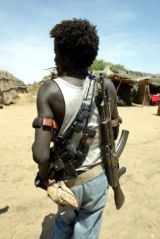AU, UN put pressure on Darfur parties to come to an greement
April 28, 2006 (ABUJA) — The warring parties from Sudan’s devastated western region of Darfur said Friday they were confident of meeting a deadline for striking a peace deal in the three-year-old conflict.

|
|
A member of Sudanese Liberation Army (SLA) walks with his rifle at Ashma village 30 km (19 miles) from Nyala, south Darfur, October 6, 2004 . |
African Union and United Nations officials have warned the Khartoum regime and its rebel foes that they must come to an agreement at Abuja peace talks by Sunday or face further international isolation.
War has been raging since early 2003 in Darfur, a poverty-stricken desert region the size of France, and humanitarian officials estimate between 180,000 and 300,000 civilians have died of disease, hunger and militia attacks.
UN aid agencies describe the situation of an estimated two million refugees as “the world’s worst humanitarian crisis” and the US government has accused the government-backed Janjaweed Arab militia of pursuing a genocide.
For the past year the government and two rebel forces — the Sudanese Liberation Army (SLA) and the Justice and Equality Movement (JEM) — have been meeting off and on in Abuja, amid mounting frustration at the lack of progress.
On Tuesday, the African Union presented delegates with a draft peace deal and urged them to sign it this week. By Friday, AU officials and delegates from both sides were saying they thought a deal was possible.
“All the concerned parties are working towards achieving that. It is in the interest of all the suffering people in Darfur that peace is restored as quickly as possible,” chief AU mediator Sam Ibok said.
Under the proposed peace deal, Sudan would create a “Transitional Darfur Regional Authority” whose prime responsibilities would be to ensure the safe return of displaced communities and organise a Darfur referendum.
The vote will decide whether Darfur should unite as one administrative unit or remain three separate states under Sudan’s federal structure.
In addition, the Janjaweed will be banned from approaching refugee camps — which they have in the past attacked — and demobilised rebel fighters will be integrated into the Sudanese army.
A Darfur rebel leader will become a “senior assistant” to the Sudanese president, and the parties will ensure that Darfur’s crippled rural economy is revived and that the region receives a fair share of national income.
Ibok said the delegates had met Nigeria’s President Olusegun Obasanjo, the former AU chairman who is hosting the talks, and that his latest intervention had spurred the peace process forward.
“He hopes that at the end of this 7th round of talks on the Darfur crisis, all the parties will get something. There will be no winner, no vanquished. Everybody will feel satisfied,” Obasanjo’s spokeswoman Remi Oyo said.
The rebel movements were Friday studying the 85-page AU document and were to meet later in the day to agree a final position on the document, a spokesman for the two groups, JEM negotiator Ahmed Tugod, said.
“We are very hopeful that we will meet the Sunday deadline set by the AU,” he said, explaining that an earlier delay had been due to a language problem.
“Although we are yet to receive the Arabic version of the AU document, we will make do with the English version… Almost 70 percent of our delegation do not understand English, but we will carry them along,” he said.
Sudan’s vice president, Ali Osman Taha, said: “We have heard the advice of President Obasanjo on how the talks will come to a successful end by the April 30 deadline.
“On our side, we have reiterated the commitment of the Sudan government to have a positive conclusion to the negotiations going on here,” he said, adding that the government regarded the AU draft as a good basis for a deal.
One AU mediator, however, also said that an extension of the deadline by “three or four days” could not be ruled out if it would bring “a final peace that all of us have been hoping for.”
“Of what use will it be if these Sudanese depart from here without achieving peace that they have come for?” he asked. “Failure in Abuja would only intensify the suffering of the Darfur people,” he warned.
(ST)
